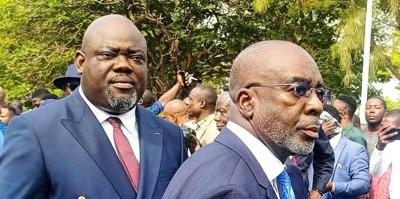On November 5, 2024, tension escalated at the Capitol in Monrovia as a protest supporting House Speaker Fonati Koffa was thwarted by confrontations between pro-Koffa supporters and employees of anti-Koffa lawmakers. The conflict came against the backdrop of serious allegations that US$750,000 had been allocated through various government agencies to facilitate a plot aimed at ousting Speaker Koffa. The accusations center around the so-called “Majority Bloc” of the House of Representatives, comprised of lawmakers attempting to remove Koffa from his position. In response to these claims, the bloc has summoned three government officials—Mo Ali of the Liberia Water and Sewer Corporation (LWSC), Transport Minister Sirleaf Tyler, and Internal Affairs Minister Francis Nyumalin—to account for their involvement in the alleged bribery.
The summoned officials are expected to appear on November 12, 2024, to clarify details surrounding the Liberia Anti-Corruption Commission’s (LACC) report which implicated their respective agencies in providing funds meant to finance the removal of Speaker Koffa. The LACC has suggested that these funds originated from the Ministry of Transport and LWSC accounts, prompting calls for transparency and accountability from the representatives. Rep. Johnson Williams, highlighting the gravity of the situation, emphasized that the House must treat these accusations with urgency and seriousness to alleviate public scrutiny and maintain institutional integrity.
Alongside these developments, the Majority Bloc has taken further steps to isolate Speaker Koffa and his supporters by mandating a formal directive that cautions other government branches—the Senate, Executive, and Judicial—not to engage in any business with Koffa’s faction. According to Representative Jeremiah Sokan from Grand Gedeh County, this maneuver is meant to solidify their control as the majority in the House of Representatives, asserting their position over the Koffa bloc which currently holds legislative sway. However, to successfully orchestrate Koffa’s removal, the Majority Bloc needs the support of 49 lawmakers, a target they have yet to achieve, as Koffa’s supporters currently have the requisite number to conduct legislative business.
The struggle for supremacy in the House continues as Koffa’s minority bloc controls important legislative activities, requiring the Majority Bloc to scramble for additional support. They have urged those aligned with Koffa to switch sides or risk facing potential repercussions derived from their non-compliance. In the meantime, the Majority Bloc is also seeking accountability from a group of Koffa supporters who allegedly disrupted proceedings on October 22, alleging that their actions were detrimental to legislative order.
The controversy surrounding Koffa’s leadership remains at the forefront of political discourse in Liberia, ultimately reflecting a broader struggle for power within the House of Representatives. As both sides navigate this tumultuous political landscape, the implications of the alleged bribery and the subsequent investigations will likely have lasting impacts on governance and public trust in governmental institutions. The anticipated hearings with the high-ranking officials will serve as a critical juncture for addressing the allegations and may shape the future of leadership in the House.
As tension mounts and political allegiances are strained, the ongoing events are not only crucial to the individuals involved but also to Liberia’s broader political fabric. The ability of lawmakers to address these allegations transparently and effectively will be pivotal, as the nation watches closely how the situation unfolds. The outcomes will likely influence future legislative dynamics and set precedence for governance, corruption accountability, and leadership roles within the country’s political system.














